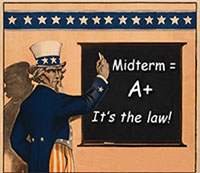
Isms in American Politics 46.310
Midterm Exam Materials and Instructions
DUE VIA EMAIL ON WEDNESDAY, 10/31/12.
You have two options:
|
Although you may quote from the texts if it is absolutely necessary, the purpose of the exercise is to test your ability to synthesize and convey ideas and information. Consequently, your summaries should demonstrate your command of the materials by presenting an overview in your own words.
Remember that you will be graded according to your ability to write college-level prose. Thus your work should be factually accurate and free of grammatical and logical errors. Please consult the Term Paper Checklist to find and correct common errors before you submit your exam. Minor mistakes will not be held against you, but if your exam indicates that you did not proofread carefully, your grade will be much lower than you might have expected. If you have writing problems, please visit the Writing Center and arrange for a tutor to help you correct your exam before you send it in. Students whose summaries indicate that they put considerable time into reviewing and proofreading their work can expect to earn the highest grades.
Please e-mail your completed exam as one attachment,, with all submissions included in one Word.doc (.doc or .docx). Since you will be submitting either two two-page essays or one four-page essay, the single document that you will send must be at least four full pages.
You must use your name in the title of your document (YourName.doc or YourName.docx) and also include it on the first page.
The midterm is due via e-mail by midnight on Wednesday, October 31, 2012. If you have any questions, please e-mail me at Susan_Gallagher@uml.edu.
Midterm Sources
Saul Cornell, "The Antifederalists: The Other Founders of the American Constitutional Tradition?," History Now, September 2007.
Lawrence B. Solum, "Judicial Activism & Strict Construction," Legal Theory Lexicon.
Bertram Wyatt Brown, "American Abolitionism and Religion," Divining America, National Humanities Center.
Frederick Douglass, “What to the Slave is the Fourth of July?,” speech delivered in Rochester, NY, July 5, 1852.
Henry David Thoreau, "Slavery in Massachusetts" (1854), The Thoreau Reader.
Ellen DuBois, "Reconstruction and the Battle for Women's Suffrage," History Now, 2006.
George Claeys, "The "Survival of the Fittest" and the Origins of Social Darwinism," Journal of the History of Ideas (April 2000), 223-240. (You must be logged in to the library to retrieve this article.)
Louis Brandeis and Samuel Warren, "The Right to Privacy" (1890).
W.E.B. Du Bois, "Of Mr. Booker T. Washington and Others," The Souls of Black Folk (1903), 25-35.
Lochner v. New York, 198 U.S. 45 (1905).
David Montgomery, "Labor in the Industrial Era," U.S. Dept. of Labor.
Phillip Taft, "Workers of a New Century," U.S. Dept. of Labor.
Progressivism and the Wisconsin Idea, Wisconsin Historical Society.
Eric Foner, "Why Is There No Socialism in the United States?" History Workshop (1984).
Joyce Kornbluh, "Bread and Roses: The 1912 Lawrence Textile Strike," Lucy Parsons Project.
About Lynching, brief excerpts from various articles, Modern American Poetry.
Times Topics: John Maynard Keyes: Read bio and Robert Skidelsky, "The Remedist," December 12, 2008.
F. A. Hayek, "The Moral Element In Free Enterprise," The Freeman, July 1962.
William A. Darity and Patrick L. Mason, "Evidence on Discrimination in Employment: Codes of Color, Codes of Gender," The Journal of Economic Perspectives, Vol. 12, No. 2, (Spring, 1998), pp. 63-90.
Griswold v. Connecticut, 381 U.S. 479 (1965).
Roe v. Wade, 410 U.S. 113 (1973).
Meritor Savings Bank v. Vinson, 477 U.S. 57 (1986).